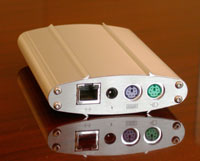Please note - Ndiyo has now officially closed its doors, at least as a legal entity - but we've kept the site alive in case any of the information is useful to others.
Our thanks to all those who helped out and were involved in so many different ways! The Ndiyo legacy lives on in the ultra-thin-client work at its spin-off DisplayLink, at Plugable, at NoPC and elsewhere...
Executive Summary
- The traditional model of networked computing - one PC per user
- has some major flaws:
- It's much too expensive for most of the world to afford
- It has a very high environmental cost
- The distributed complexity is difficult to manage
- We therefore must find another model, unless we are going to tell two-thirds of the world that they cannot participate in this new digital world we've created.
- Ndiyo has a model. It's not the only one, nor necessarily the best one, but it does work now using today's technology. It's based on sharing the power of a PC between several users at once. Today's computers are easily capable of supporting multiple users, but in the past there hadn't been a convenient and affordable way to do this. We fixed that.
- We took advantage of a key feature of Linux - that every Linux-based PC supports multiple simultaneous users. To date, this has been under-used, because there hasn't been low-cost hardware to take advantage of it.
- We therefore stimulated the creation of suitable low-cost, but high-performance, hardware. We wanted users to have a high-quality computing experience even though it was also a more affordable one!

- The hardware was an 'ultra-thin-client' - a device which allowed an extra display, keyboard and mouse to be connected to the computer via a standard network cable. Our design criteria were rather different from those employed in traditional thin clients.
- We combined this with Open Source software, which meant that there were no software licensing costs associated with adding extra users.
- Arbitrary numbers of these terminals could be connected to a single PC. For a typical desktop machine, we found somewhere between five and ten users to be a reasonable load.
- This model brings significant advantages, including ease of administration, substantial cost savings, and lower environmental impact.
- Trial systems were successfully used in a variety of organisations around the globe.
- Ndiyo is a donor-supported non-profit UK organisation working to make this model accessible to the world.
- At present we have exhausted our available resources, so further work is on hold, but we'd be keen to hear from anybody interested in supporting the ongoing development of the Ndiyo approach.
Please explore the site to see further information on all of these points, along with pictures, videos, presentations and discussions about our work.
